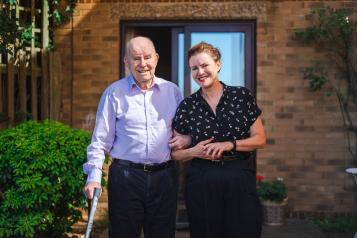Exposing the unmet need in social care: Your stories

Social care can be transformative to people who get it. However, our latest research shows that 1.5 million eligible adults in England might not be accessing this life-changing assistance.
You shared your stories about how social care could make a positive difference in your lives.
Tanya
Tanya has several physical and emotional conditions and requires support to help her live life comfortably and safely.
Tanya told us that she suffers from blackouts and dizzy spells in addition to other symptoms, including incontinence.
Adjustments to her home, like having a bathtub she can sit in instead of a walk-in shower (in case she collapses during a blackout or dizziness while bathing), would make her feel safer doing daily activities. There's a ramp to her house, but it becomes too dangerous for her to use if it is icy or wet. "I'm trying to avoid falling all over the place," she explained. "My movement is so limited now."
Tanya will need to pay £149 to her council every week to receive social care support. This would wipe out her PIP payment, which she already relies on to cover her basic caring needs, including a cleaner and mobility help in her home. On top of other costs, such as heating and electricity, the added expense is unobtainable to her. Tanya is already struggling with the cost of living and her social care needs.

Tanya described there being 'absolutely no chance' of getting more care support. "You can't access help because it's priced out of your range or the answer (to her requests for help) is 'no'". However, with more support from social services, Tanya thinks her safety and quality of life would improve.
The lack of support has a profound effect on Tanya's daily life. She doesn't feel confident leaving her house without someone like a support worker to help her, in case she suffers a blackout and collapses. “When I’m at home I can grab on to something if I fall, but I can’t do this if I’m outside. I can’t even go as far as the bus stop,” she explained. “And as for anything social, there's absolutely no chance. Even if I didn't have these symptoms, I can't even afford to go to a café for a coffee," she explained.
"I’m isolated because I can’t get help. Ask yourself something; would you want one of your relatives to live like that?”
Support for carers is important too: Alan's story
Alan, 65, from Rotherham, is a full-time carer for his wife, Kathleen.
Kathleen was diagnosed with Alzheimer's disease in 2021. She had shown symptoms of illness since around the onset of the pandemic, but because of lockdowns and the general disruption to lives at the time, neither Alan nor his wife took too much notice of these early signs.
Alan looks after most aspects of Kathleen's daily life. He sorts out her medication, makes her meals, washes and irons her clothes and arranges her medical appointments. He makes sure that she's looked after and is comfortable.
"Today it's hot out, but she wanted to wear jeans and a jumper instead of suitable clothing," Alan shared as an example of how he looks after Kathleen.
When Kathleen was first diagnosed, Alan explained to us that she was under 65 and eligible for support from the 'young dementia department'. A nurse and support workers were assigned to Alan and Kathleen to help with her care and answer any questions. They used to visit Alan and Kathleen on a regular basis to check in on them, but once Kathleen turned 65, this support was discontinued.

Now, Alan and Kathleen don't get any formal support from their local services. Alan did have an assessment of himself from the local social care team; they went through what he does to support his wife and explained what technology he could have to help him take care of her. But there was no discussion about other types of support he could get, such as a care support package.
Instead, Alan was left to research other support that is available to him. He learned he's entitled to 32 hours of free care—after this, he'll have to pay for help. As such, and as long as he's able to help her, Alan's reluctant to ask for this service in case something happens that means he can't take care of her. But Alan did say that an Admiral nurse visits every eight week’s and that Crossroads Care (a local support organisation) are always available for him via telephone.
"If anything happens to me – that's one of my biggest fears. So I have to put all of these scenarios in place to make sure Kathleen is taken care of. That has been a challenging thing to sort out," Alan told us.
Missing millions: Exploring unmet social care need for disabled adults
Ten years since the Care Act 2014 came into force, up to 1.5 million working-age disabled people in England could need social care support but are not accessing it. This means they are likely to be missing out on help with daily activities such as washing, cleaning, socialising, and going to the shops.


